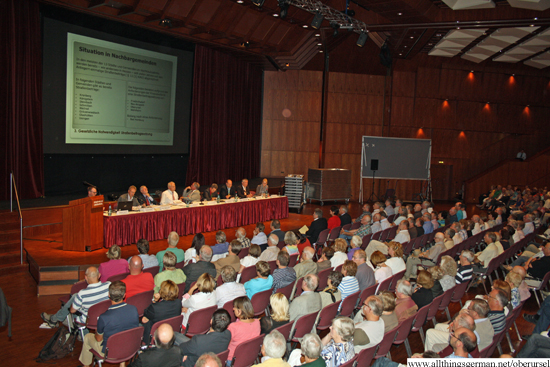There is one topic in Oberursel that has probably been discussed more than anything else this year. If not, then it is at least on par with the new swimming pool and the re-development of the station area. And yet, unlike those other two subjects, it is one that is not so easy to understand.
It is the “Straßenbeitragssatzung“.
The amount of interest in this particular topic was demonstrated in August, when a Bürgerversammlung was held in the Stadthalle to inform members of the public about it and also to hear their views. So many people turned up, that the start of the evening was delayed for safety reasons and the partition wall was removed from the hall to increase the capacity – something that even those on the stage confirmed has never happened before – not even for the evening about the swimming pool!

The Stadthalle on 21st August 2013
Officially there were 600 people in the audience, although the seating plan for the hall suggests it may have been even more.
So what is the “Straßenbeitragssatzung” and why is it so important?
Well, put very simply, if you build a house then you have to pay to have it connected up to the town’s infrastructure. And if that involves building a road, then the houses along that road usually have to pay towards the costs of building it – the “Erschließungsbeitrag”.
However after that, the costs of maintaining the road fall to the local government, usually the town in which the road is, but sometimes with other levels of government contributing as well if the road is important enough.
But roads only have a certain life expectancy before they need not just re-surfacing, but re-laying completely. Until now, these costs in Oberursel have also been met by the town, and it is the Straßenbeitragssatzung that is meant to change this.
Of course, if you build a house, then you can expect to be hit by these costs at some time, but what if you move into one, not knowing that in a couple of years time the road is due to be done and suddenly receive a bill for, say, €10,000?
One idea is to charge a smaller fee on an annual basis, eg. €250 per year for an average size property, and to keep this back on an area-by-area basis to pay for the road re-laying costs at a later date. It sounds fairer this way, but it is not without some doubt that the local politicians approach this model, since it has only recently been allowed at all and so there is little or no experience of how people react to it.
How do you cope with people who do not own a car and as such do not use the roads?
How do you cope with roads that are used commercially, and therefore more heavily, but also have residential parts to them?
Which formula do you use to calculate how shared properties contribute? What about second homes? What about rented garages?
The list of these situations to deal with appears to be endless, and then there is the simple question: who decides when the road needs re-laying in the first place?
Until now that has been a matter for the town to decide, and since they are paying for it out of their own budget, raised mainly by taxation, it may cause some discussion, but not really protest on the part of those living there. But once they start paying for the work more directly, some may want to play a more active role in the decision.
For the town, the regular payments may mean more administrative work, requiring someone in the town hall to actually calculate how much each household owes and send them invoices for that money each year. Either that, or they stick to the old system that other towns currently use, and charge the larger amounts after all, but just in the roads affected each year.
And it is easy to forget the the town already levies a land-owners’ tax (“Grundsteuer B”) on the same group of people anyway.
But whether or not to introduce the fees is probably a moot point – even if many do not yet see it that way – because the District Administrator (“Landrat”) has made it a condition that the town do so if they want their 2014 budget approved.
However many of the parties in the town council rejected the idea anyway, and recently approved a budget without a Straßenbeitragssatzung, with one councillor even calling the others “disobedient” for doing so.
So what will 2014 bring? A Straßenbeitragssatzung and a further financial burden on the citizens of the town? Or a budget that is not approved and therefore a town that is restricted in what it can spend money on?
Or was it all just a big storm in a proverbial teacup, which will blow over if the town manages to balance its budget in other ways?
Whatever the outcome, 2014 promises to be an interesting year for the town. If you want to know how this story ends, then stay turned to AllThingsGerman.net Oberursel and sign up to the newsletter on the right-hand side of the page and we’ll let you know!




